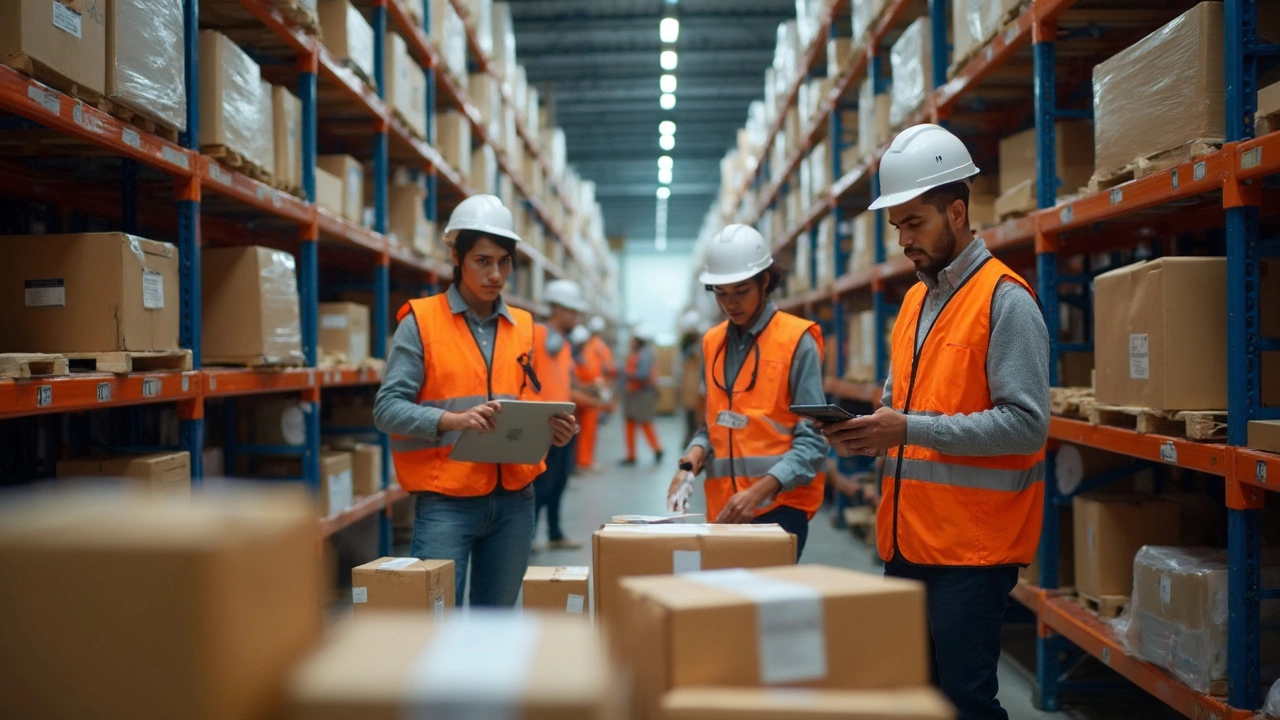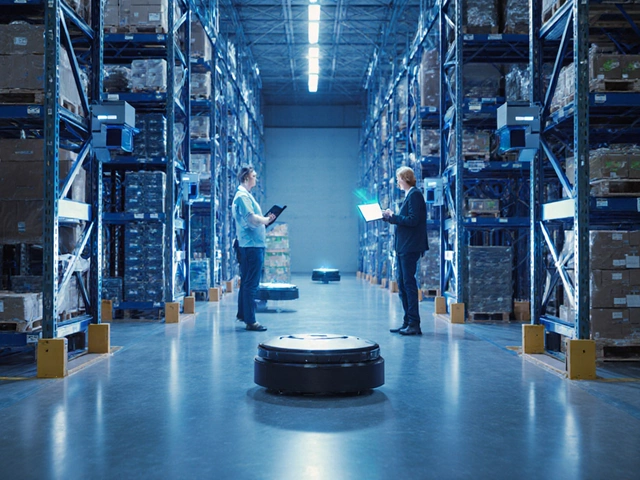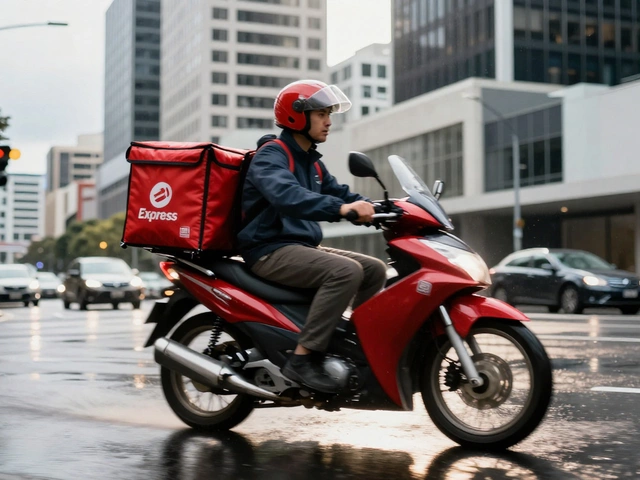You click “buy now,” and in some warehouse miles away, someone’s already working to get your order shipped. That magic in the middle? That’s where e-commerce logistics specialists step in and make things happen. Without them, your new shoes or phone case might get stuck in a warehouse or lost in transit.
Their job isn’t just about boxes and barcodes. These folks keep online stores from turning into chaos by tracking stock, choosing the best shipping options, and juggling returns—basically making sure your order gets to your door without a hitch. They’re the problem solvers you never hear about, but your smooth shopping experience depends on them.
If you’re running an online store, knowing how logistics specialists work can save you time, money, and customer headaches. And if you’re thinking about getting into this field, understanding these behind-the-scenes roles can help you stand out when it comes time to get hired.
- The Core Role: What’s in a Day?
- Key Skills Every Specialist Needs
- Tech Tools They Can’t Live Without
- Common Challenges and Quick Fixes
- Impact on Customer Satisfaction
- Tips for Aspiring Logistics Pros
The Core Role: What’s in a Day?
An e-commerce logistics specialist’s day starts way before the orders even roll in. First thing, they check inventory numbers—are the shelves looking good, or are popular items on the edge of a stockout? Running low triggers more than just a note; it means getting in touch with suppliers ASAP to avoid lost sales or angry users refreshing their tracking link all day.
Once orders start coming in, these specialists jump into action. They coordinate order processing, making sure items are picked accurately from the shelves and packed with the right labels. If you’ve ever gotten exactly what you ordered, down to the size and color, it’s probably because someone double-checked your order against the pick list.
When it comes to shipping, it's not one-size-fits-all. E-commerce logistics specialists review available couriers, compare delivery times, costs, and reliability, then pick the method that best fits the company’s promise—think two-day delivery or same-day drop-off in certain cities. Some specialists even monitor real-time carrier performance, so if USPS is delayed and FedEx is flying, they switch things up mid-day.
They’re also on top of returns, which, let’s be honest, is a headache if not managed right. Specialists keep the process streamlined, making sure returns are tracked, restocked quickly, and refund requests don’t fall through the cracks. This matters because efficient returns are a huge factor in whether shoppers come back for more.
- Daily inventory checks and stock updates
- Coordinating picking, packing, and labeling
- Choosing and scheduling couriers for every order
- Keeping an eye on delivery tracking and exceptions
- Managing returns and refunds promptly
Beyond all this, these pros work closely with sales and customer service teams, because what happens in logistics affects everyone. A logistics specialist wears a bunch of hats—part planner, part problem-solver, part customer advocate—so every day is a mix of routine checks and fast responses to whatever comes up.
Key Skills Every Specialist Needs
A good e-commerce logistics specialist brings more to the table than just a love for packages. Their skill set is practical, hands-on, and super detail-focused. Mess up one tiny thing, like a wrong barcode or missed address, and orders go sideways in a hurry. Here’s what separates the best from the average.
- E-commerce logistics knowledge: They need to know supply chain lingo, shipping methods, and how online retail works. It helps if they understand the way big players (like Amazon or Shopify) do it.
- Tech savvy: Most warehouses use inventory software, order management systems, and tracking platforms. A specialist should know their way around popular systems like ShipStation, NetSuite, or even Excel for quick counts.
- Problem-solving: Orders get lost. Stuff gets damaged. Carriers delay shipments. The best specialists are quick on their feet, always scanning for backup plans or workarounds.
- Communication: They have to coordinate between warehouse teams, courier services, and sometimes even grumpy customers. Clear written and spoken updates keep everyone in sync.
- Attention to detail: No cutting corners. Scanning the wrong order or missing a return can cost a company money and reputation.
- Time management: E-commerce moves fast. Specialists often manage dozens or hundreds of orders a day and deadlines are tight. If they’re not organized, delays pile up fast.
If you’re looking at hiring or becoming a logistics specialist, here’s a quick rundown of what recruiters actually look for, according to LinkedIn’s 2024 e-commerce job survey:
| Skill | % of Job Listings Requiring It |
|---|---|
| Inventory Management | 89% |
| Shipping Solutions | 82% |
| Order Fulfillment | 86% |
| Warehouse Software Proficiency | 74% |
| Customer Service | 61% |
If you want to stand out, start learning new shipping software and hone your attention to detail—these are hard to automate and always in demand. Mastering even just a few of these skills can put you ahead of the crowd.
Tech Tools They Can’t Live Without
If you ask any e-commerce logistics specialist what makes their job possible, they’ll chuckle and say it’s all about the right tech. Without the right tools, nothing gets done—orders get lost, stock runs low, and customers start sending angry emails. Let’s get into what actually sits on every logistics specialist’s must-have list.
The backbone of almost every operation is a solid Warehouse Management System (WMS). Programs like ShipBob, NetSuite, and Fishbowl help keep tabs on every item: what’s in stock, what’s running low, and where everything sits on those tall shelves. This isn’t just scanning barcodes; it’s making sure the right product moves at the right time, every time.
Order Management Systems (OMS) take over from there. Shopify and Magento, for example, notify specialists about new sales, split orders across warehouses, and handle tricky things like split shipments or partial returns. With these tools, mistakes drop and timelines stay realistic.
Shipping isn’t simple either. Logistics pros lean hard on shipping platforms like ShipStation, Easyship, or even UPS’s own online tools. These let you compare courier prices, print shipping labels fast, and track packages in real time—all without getting up from your chair.
- Inventory tracking tools let you count and forecast without ever picking up a clipboard. RFID scanners and digital dashboards make counting stock way less painful than old-school methods.
- Returns management platforms like Returnly or Loop return, streamline refunds and exchanges, cutting down on delays that annoy customers and eat up staff time.
- Communication apps (Slack, Teams) and cloud-based documents (Google Sheets, Airtable) keep everyone in the loop, from the warehouse floor to the boss’s inbox.
Without these tech tools, it’s nearly impossible to run a smooth e-commerce logistics operation. The right setup means fewer mistakes, faster shipping, happier customers, and less chaos for everyone behind the scenes.

Common Challenges and Quick Fixes
When you talk to anyone in e-commerce logistics, you’ll hear about the same handful of problems over and over. Orders get delayed, stock levels go out of sync, packages get damaged or lost, and returns pile up fast. It can feel like you’re constantly putting out fires, but there are real tactics specialists use to tackle these messes.
One big headache is orders arriving late. Most delays come from bad weather, busy seasons like November, or carrier mistakes. A quick fix? Always have a reliable backup carrier option and use real-time tracking tools, like ShipStation or AfterShip, so you can update customers and keep complaints to a minimum.
Inventory mix-ups come next. Maybe you sell out of a hot item and forget to update your online store, or worse—sell something you don’t even have in stock. That’s where syncing your store’s platform (like Shopify or WooCommerce) with your warehouse inventory system is key. Even small businesses can use software for that now, so mistakes happen way less often.
Lost or damaged parcels happen more than anyone wants to admit. One tip is to use durable, right-sized packaging and avoid shipping fragile items with bulky ones. Some companies put QR codes inside the box so they can trace lost shipments back to the warehouse or driver, which is a simple but clever way to spot where things go wrong.
Returns can bury a small team, especially after holiday sales. To make it easier, smart logistics specialists use automated return labels and clear return policies right in the package. Apps like Loop Returns or Returnly let customers start the process on their own, cutting down on emails and headaches for everyone.
- Backup carriers for shipping delays
- Inventory syncing with store platforms
- Durable packaging with tracking inside
- Automated tools for managing returns
Tackling these challenges isn’t glamorous, but each quick fix means happier customers—and that’s what keeps any online shop in business.
Impact on Customer Satisfaction
If you’ve ever had an order show up late or damaged, you know how fast your mood can change. The work of an e-commerce logistics specialist shapes nearly every part of the customer experience. Customers want items fast, undamaged, and exactly as described—that’s non-negotiable these days.
Online shoppers have sky-high expectations: Over 90% of shoppers say shipping speed factors into whether they’ll buy again from a store. Even a one-day delay can mean they turn to a competitor next time. This is why logistics specialists obsess over details like inventory accuracy, careful picking, and choosing the right shipping partners.
Returns are another big deal. Around 30% of online orders get returned, and how quickly and painlessly the process happens can turn a one-time buyer into a loyal customer. Fast refunds and no-hassle returns often get more people to shop from the same store again.
- Accurate tracking links help customers relax while they wait, and studies say 97% of people want to see real-time package tracking.
- Smart packaging choices mean fewer damaged items, which reduces complaints and keeps reviews positive.
- Clear delivery updates cut down on "Where’s my package?" support tickets, saving time and keeping customers happy.
| Key Metric | How Logistics Specialists Make a Difference |
|---|---|
| Delivery Time | Optimize routes, partner with fast carriers |
| Order Accuracy | Double-check picking and packing processes |
| Returns Handling | Streamlined returns for fast refunds |
| Customer Support Tickets | Cut down by sharing proactive shipping updates |
E-commerce giants like Amazon and Zalando put logistics at the center of customer satisfaction. Smaller shops can do the same by making sure their logistics team stays sharp, focused, and always learning. The bottom line? Smooth logistics work keeps customers coming back—and telling their friends too.
Tips for Aspiring Logistics Pros
Thinking about breaking into e-commerce logistics? There’s a lot more to it than just moving boxes. The industry is growing fast—worldwide e-commerce sales hit nearly $6.3 trillion in 2024, and that means a sky-high demand for problem solvers who can keep up with online shoppers’ expectations.
Here’s how to give yourself an edge:
- Get to know inventory tools. It’s not just spreadsheets anymore. Learn popular inventory management software like NetSuite, ShipBob, or Shopify’s backend. Even a quick demo or free trial can show you how real-time tracking works.
- Sharpen your communication skills. You’ll deal with suppliers, warehouses, delivery drivers, customer service, and sometimes even frustrated shoppers. Clear, calm messages keep things on track.
- Be comfortable with data. Know how to read shipping reports and spot trends. If you can figure out why delays happen or where orders get lost, you’re already ahead of the pack.
- Get certified if you can. The Council of Supply Chain Management Professionals (CSCMP) offers actual certifications. They cost a bit, but for entry-level jobs, showing you’ve put in the work can really help.
- Stay current. E-commerce changes fast. Use news sources like Supply Chain Dive or Logistics Management to keep tabs on new delivery tech, warehouse robots, and last-mile trends.
Here’s a quick look at real skills companies want right now:
| Skill | Companies Prioritizing (%) |
|---|---|
| Inventory Management | 82% |
| Data Analysis | 75% |
| Shipping Coordination | 68% |
| Customer Communication | 65% |
One last tip: Jump in wherever you can. Even if it’s a small online shop, it’s real experience. The best e-commerce logistics specialists started with hands-on roles and learned what goes wrong—and how to fix it—before moving up.





